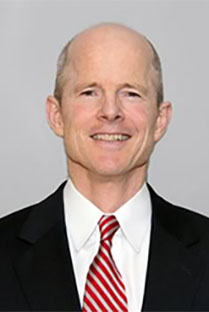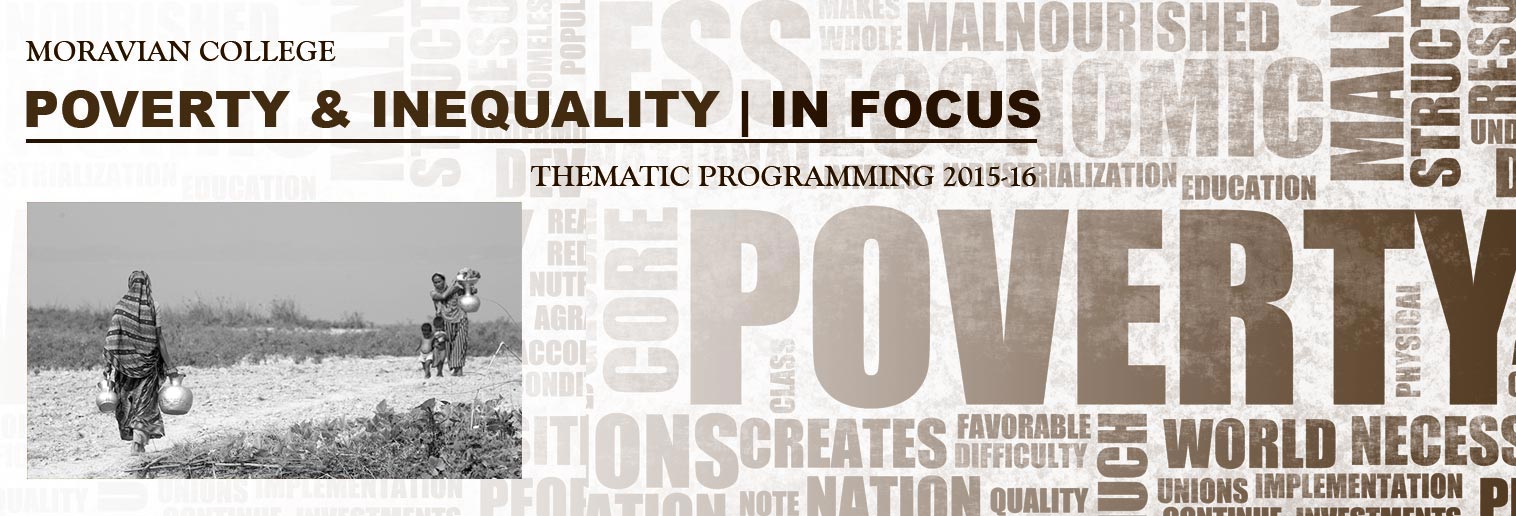2016 In Focus Symposium:
Running with Our Research
By Nicole Tabor, Co-director for the Center for Investigation on Poverty and Inequality
"I think this Symposium has set the model for how we should address teaching—not running away from our research but running with it."
—Dr. Heikki Lempa, associate professor of history, Moravian University
On April 5th and 6th Moravian University hosted a Symposium entitled: “Ending Extreme Poverty: Understanding Poverty and Inequality Through a Multidisciplinary Lens.” The Symposium was dedicated to the late Gordon Weil, former Dean of the Faculty, who initially co-founded the In Focus Program in 2011 in collaboration with faculty members including Sonia Aziz, current Co-director for the Center of Investigation for Poverty and Inequality and associate professor of economics and business. As Aziz reminds us, development economist Amartya Sen contends that poverty is a deprivation of resources and capabilities and a violation of basic human rights. The 2016 In Focus Symposium allowed participants to understand how cutting-edge, real-world research helps us to address questions about these academic definitions and illuminates the lived experience of poverty and inequality from experts who have made this research their life’s work.
Over the course of two days, the Symposium welcomed a total of 194 guests. The first panel introduced what would become a major theme over the course of the symposium--the economic and scientific implications of clean drinking water. Three symposium panels foregrounded the water-quality crisis and cutting-edge research and development to mitigate risk, particularly with respect to safe water access in developing countries. These panels, as with most discussions at the Symposium, yoked Moravian students’ research with top international scholars representing the United Nations (UN), the United States Agency for International Development (USAID), the National Institutes of Health (NIH), as well as Aziz whose most current research focuses on investigating satellite earth observations that will support “better decision-making strategies to prevent or minimize the impact of a cholera outbreak in communities plagued by poverty and inequality.”
Similarly, the presentation made by Diane Husic, professor of biology and dean of the college of natural and health sciences--“Disparate Impacts of Climate Change, Marginalization and Inequality”--addressed how climate impacts are felt in developing nations while also reminding audiences of Moravian students’ important investigatory roles both in and out of the college classroom. Husic partners with Moravian faculty to take students annually to the National Conference on Undergraduate Research, United Nations Climate Change talks, and other key loci, such as this symposium, to share current research and dialogue. “At this In Focus symposium, students, faculty, and colleagues and collaborators from other institutions and countries shared research and engaged in dialog that transcended traditional disciplinary boundaries,” says Husic.
The symposium’s plenary speaker, Stephen O’Connell, Gil and Frank Mustin professor of economics at Swarthmore College, served as chief economist of the United States Agency for International Development (USAID) in 2014 and 2015. O’Connell shared his vision for ending extreme poverty and spoke about past, present and future research into the challenges of economic transformation in countries with persistent extreme poverty. He explained the international cooperative efforts toward the goal of ending extreme poverty and spoke to the prospects for achieving that goal, guiding the audience with USAID’s foci on consumption poverty and proactively connecting with the poor. He then engaged the audience with an insightful question-and-answer period, showcasing his powerfully expressed vision of a global and enduring commitment to ending extreme poverty.
Moravian students attended a variety of multidisciplinary panels throughout the symposium, making connections between panelists’ subject matter and their own scholarly interests. Lempa’s humanities panel, “Poverty, Morality, and Wealth,” included the work of Provost and Dean of the Faculty Cynthia Kosso, Associate Professor of Religion Jason Radine and Assistant Professor of History Akbar Keshodkar.
Further diversifying the Symposium’s multi-disciplinary perspective, Angela Fraleigh, associate professor of art, led a panel “The Art of Subversion: Tacking Gender Inequality in the Arts” on Moravian’s South Campus. Sandra Aguilar Rodriquez, assistant professor of history, chaired the panel “Food in the Public Square,” which focused on different ways humanities scholars ask compelling research questions about poverty and inequality in the context of a project funded by the National Endowment of the Humanities entitled “Food and Community: The Collective Human Experience.” During the panel, faculty from Northampton Community College, Lehigh University and Bucks Community College joined Aguilar Rodriquez in articulating their project’s goals to “increase the participation of underrepresented populations in community discussions focused on the examination of the human relationship with food and how we can ensure an adequate, safe and appropriate food supply for the Lehigh Valley.”
Student-focused panels on “Healthcare Inequalities” and “Mindfulness at Moravian” allowed participants to connect their Moravian coursework to larger national and international discourse regarding poverty and inequality. The symposium encouraged the Moravian community to make connections between “town and gown” – our research on campus and the working world at large, such as Professor of Economics and Business Santo Marabella’s research to define, understand and mitigate the impact of bullying. Marabella presented his research “Measuring of the Performing Arts on Social Change.” As with some other Symposium presenters’ work, including Fraleigh’s, Marabella’s research was funded in part through a new partnership between the In Focus Program and the Mellon Foundation, led by Erica Yozell, associate professor of Spanish and modern languages and literatures and coordinator of Mellon-funded initiatives. Marabella’s work continues to involve Moravian University students in scholarly research in and out of the classroom and uses the performing arts as a strategy to build empathy for the bully and thus “examine the crucial role of compassion in diminishing inequality.”
Emily Anderson ’17 helps us to consider how work like Marabella's constructs important new knowledge. “I found it interesting and insightful,” she says, “particularly the aspect of utilizing the performing arts to raise awareness about the issue of inequality and the importance of empathy.”
With regard to the Symposium overall, students expressed an appreciation for the emphasis on research with implications for the classroom, professional scholarly community and society at large. The Symposium engaged, informed and challenged participants with a salient cross-section of interdisciplinary research and development serving humanity today.
Discussion, Collaboration, Advocation
How the In Focus Poverty and Inequality Symposium realized Dean Weil’s vision of an aware campus.
By Chris Hassay ’17
“Our goal is for Moravian University to realize the promise of becoming known as an institution that engages its students in the study of important issues that challenge humanity today and as we look to the future.” These words once spoken by our beloved Dean Weil, and printed along the back cover of InFocus’ latest event booklet, rang true as the Symposium in his honor achieved the lofty vision Weil himself idealized.
The 2016 In Focus Symposium on Poverty and Inequality held on April 5 and 6 not only provided the Moravian community an in-depth look at extreme poverty around the world, it also highlighted possible solutions to some of the most intense global problems. The event was held in honor of the late Dean Gordon Weil and took his own personal philosophy of seeking creative solutions to combat poverty as its central theme, making for a powerful and informative two days.
Featuring 11 different panels, the Symposium showcased an astounding array of topics including perceptions of wealth evident in the Hebrew Bible, arsenic removal in Bangladeshi rural water sources and gender inequality evident in the arts--all uniquely informative and all focused on the impact of these issues in relation to inequality. Visiting presenters discussed their work, often highlighting economic causation and indicating areas of potential improvement in their respective focus. Plenary speaker Stephen O’Connell, Gil and Frank Mustin professor of economics at Swarthmore College, provided an excellent overview of economic standing and poverty in a global context in his presentation “Extreme Poverty.”
O’Connell, former Chief Economist of the United States Agency for International Development (2014-2015) and currently a consultant to the International Growth Centre has worked tirelessly toward solving issues facing the poorest nations in the world. He drew upon his extensive history in developmental economics to discuss poverty and engage our Moravian community. His experience, knowledge and deep passion combined for a powerful presentation.
What made all of the Symposium presentations so valuable was their proactive stance on major issues related to poverty. The In Focus event was as much about working toward a better future as it was informing on inequalities in our current world--a combination Dean Weil stressed to the Moravian Community. Students and experts discussed some of the most pressing issues around the globe and how they affect our society, epitomizing the Moravian research community envisioned by Weil.
The event recalled Weil’s work and his tireless contributions to the campus, but it became much more than that. The programming was targeted, poignant, and most importantly sparked conversation and proactive response from the Moravian Community. These are the things Weil stressed, and these are the things that will continue to keep him in our thoughts here at Moravian University.

